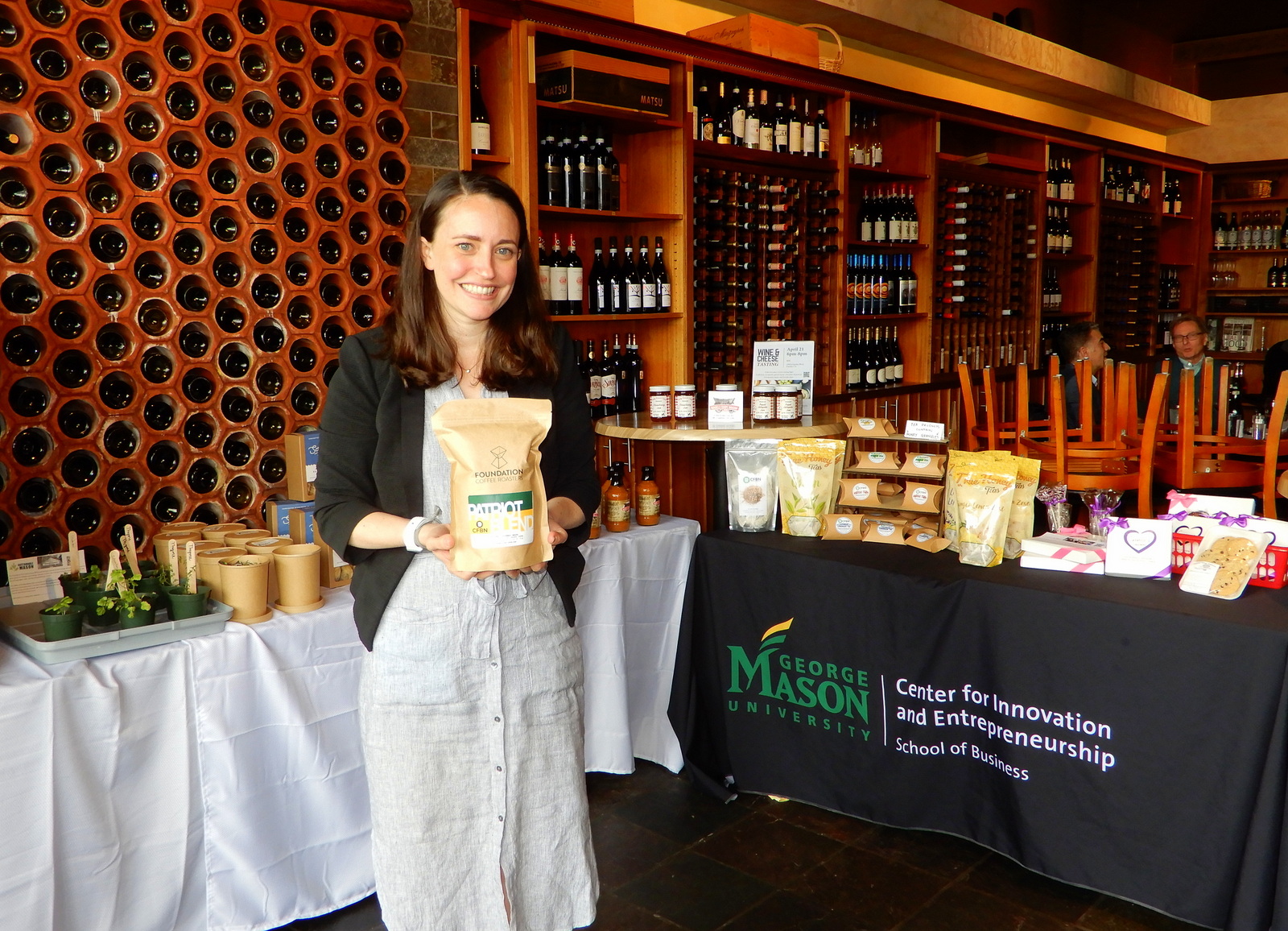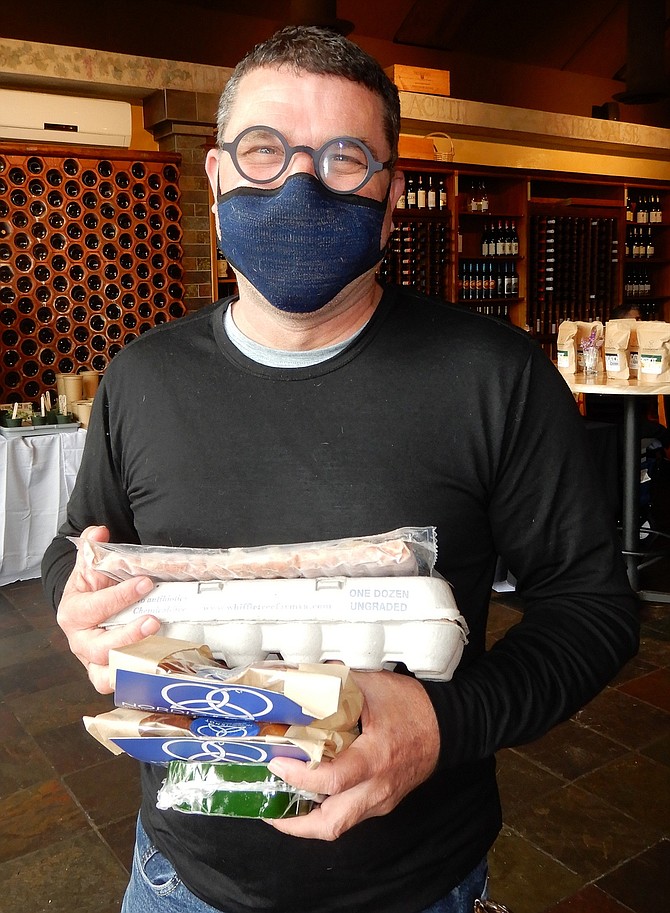GMU’s Center for Innovation and Entrepreneurship (CIE) has an exciting, new program, and it benefits students, food and beverage producers and the local community. Called The Depot, it’s headed by CIE Interim Director Becky Howick.
“We’re partnering with the City of Fairfax EDA [Economic Development Authority] and have also received support from the Community Foundation for Northern Virginia,” she said. “This semester, we’re hosting a variety of events providing learning through experience for our Mason students, while creating new revenue channels for Fairfax City restaurants and connecting food and beverage producers with customers.”
So far, there have been three events in March, and two more, including a farm-store pop-up and a wine-tasting at Dolce Vita Italian Restaurant and Wine Bar, are set for April 20 and 21, respectively. The first one, held March 17, was a cooking demonstration at Mama Chang, a popular Chinese restaurant in Fairfax.
 GMU’s Becky Howick by the pop-up farm market inside Dolce Vita.
GMU’s Becky Howick by the pop-up farm market inside Dolce Vita.
“It was for members of the community,” said Howick. “And it allowed the students to meet the restaurant’s owners and see how the event and marketing pieces fit together.”
The second and third events, the afternoons of March 22-23, were both retail, farm store pop-ups at Dolce Vita. The EDA put them in touch with the restaurant, and the students participated in every aspect of these farmers-market events. Dolce Vita was the host, but the students contacted the vendors, placed wholesale orders with them and then sold their products at the markets.
“This gives them a sandbox experience to learn, for example, the margins between the wholesale and retail prices,” explained Howick. “They get to see if a business is sustainable without putting their own life savings on the line and learning difficult lessons that way.”
Each market features a large variety of items, such as coffee from Foundation Coffee Roasters and chocolates from Cameron’s Coffee & Chocolates, both City businesses. Other products come from businesses outside the immediate area, such as pasture-raised meat and eggs from Whiffletree Farm in Warrenton.
In each case, students would talk to the vendors to learn about them and their products so they could tell the customers about them and answer any questions. Then they’d place orders and sell the items for the vendors (credit-card sales only) at their farm markets.
“The goal is to let the students see what it’s like to put on events, make sales, learn how businesses operate, work with restaurant owners and interact with the public,” said Howick. “It’s a whole hands-on, entrepreneurial experience. The vendors get the money from our purchases, and we get the proceeds from the retail sales so we’ll have enough money to continue with the program and make it a sustainable business model.”
Students find out who the customers are, what they’re looking for, what are the revenue streams and what the costs are to put on these types of events. They also learn about inventory – how many items to purchase, plus their shelf lives – as well as the importance of accounting and marketing skills.
“They get a realistic look at what goes into being an entrepreneur and how to connect vendors with restaurant owners,” said Howick. “For example, Dolce Vita was so pleased with Whiffletree Farm’s products that they’re going to start using some of them in their dishes.”
Besides Foundation Coffee and Cameron’s, vendors at the March 23-34 markets included: Rocky Branch, homemade jams and jellies; Shenandoah Valley Family Farms, organic milk and cheese; GMU, microgreens and herbs from its campus greenhouse; True Honey Teas; Nordic Knot, gourmet pretzels; Green Body, T-shirts; Country Village Bakeshop, cookies; and Wadel’s Farm Wagon, fresh pasta and sauce, baked goods, barbecue sauce and salsa.
At the March 24 market, customer Brenda Young, headed to the payment area with some chocolate chip cookies, pappardelle pasta, radishes and microgreens. “I came here for the second time, after seeing what they had at the first market,” she said. “Mason is growing microgreens, and they’re wonderful on salad. I like this market, and Dolce Vita’s a great venue for it. I prefer getting local, handmade items, and I’d recommend others come here, too, because it’s great to support the community.”
Thomas Castro bought some large pretzels, a dozen eggs, cheddar cheese and pork breakfast sausage. “I like farmers markets, and it’s handy that there’s one here and that it’s connected to GMU,” he said. “I’m a GMU student and used to have a farm, so I understand the value of these products. They’re better than what you can buy in the store. The producers are doing this because they care about their animals, and it’s a better way to produce food. And buying their products here is one little thing I can do to help.”
Meanwhile, GMU student Sydnee Wright purchased snickerdoodles from Country Village Bakeshop and a basil plant from GMU’s greenhouse. “It’s nice to be able to come into a place where we’re supporting businesses in the local Fairfax area,” she said. “They’re also entrepreneurs, and at least half the vendors – including True Honey Teas – are Mason alumni, so that’s good, too. And part of the proceeds goes toward GMU’s Patriot Pantry that helps students with food insecurity.”
A member of The Depot student team, freshman Vinati Konda, manned the checkout area. “I really like being able to connect with all these small businesses and find out their stories,” she said. “For example, Cameron’s employs intellectually and physically disabled people because, like the store’s slogan, they believe ‘Everyone Can Work.’ And I love seeing how people come in just to support Mason and/or the small businesses.”
She’s also learning how to interact with customers and cater to their interests. “We’re building more of a sense of community between Mason, Northern Virginia businesses and the Fairfax City community,” Konda said. “And it’s helpful because I’m also learning about how to run a small business – especially the marketing, networking and event coordinating.” Any leftover products are sold at campus kiosks to the GMU students, she said.
Crystal Fickers, GMU’s CIE program manager, called The Depot a great way for students to obtain firsthand knowledge of the business world and what it takes to be an entrepreneur. “Then when they graduate, they can put it on their resumé,” she said. “Or they can even have the confidence to start their own businesses because they’ve learned each element of doing so.”
Upcoming Events
*Another farm-store pop-up market will be held Wednesday, April 20, from 11 a.m.-3 p.m., at Dolce Vita, 10824 Fairfax Blvd. in Fairfax City. Open to the public.
* A wine tasting is planned for Thursday, April 21, from 6-8 p.m., at Dolce Vita. Wines from Dolce Vita and other local wine producers will be paired with cheeses from Shenandoah Valley Family Farms and artisanal chocolates from Cameron’s. Wine experts will be on hand to answer questions, and a Cameron’s representative will talk about the chocolate-making process. Tickets are required for the wine tasting, and part of the proceeds will go toward charity. For more information, go to https://advancement.gmu.edu/ciesipandsmile.